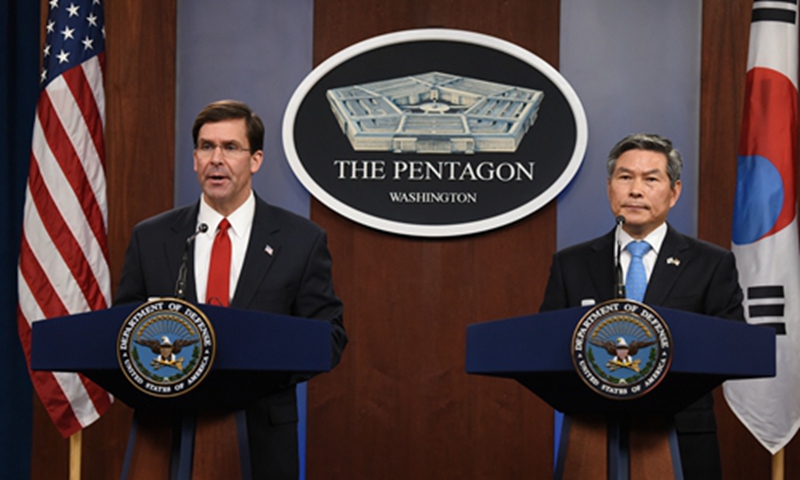
US Secretary of Defense Mark Esper meets with visiting South Korean Defense Minister Jeong Kyeong-doo on February 24, 2020. Photo: CNS
The 52nd US-Republic of Korea (ROK) Security Consultative Meeting (SCM) was held in Washington on October 14. Unlike past SCM statements, the joint communique did not mention the US' commitment to maintaining its troop levels in South Korea for the first time in 12 years. Following this, the Pentagon abruptly canceled a joint press conference that was supposed to be held after the meeting — for unspecified reasons.
In fact, Seoul and Washington have a long history of conflict — especially with defense matters. These tensions have been long simmering, but have recently become further exacerbated. For example, US troops sparked anger in South Korea after they fired fireworks and brawled in the streets of Busan on July 4. In addition, ongoing disputes over the wartime operational control transfer have arisen as salient factors.
In this context, the US is exerting pressure on South Korea from all sides. Despite US President Donald Trump has raised defense spending, Washington is pushing Seoul to both spend more for the US military presence and press back against Beijing - by making it choose sides in the ongoing US-China imbroglio.
As far as Washington is concerned, the US-Japan alliance and the US-South Korea alliance are foundational for the presence of the US in the Asia-Pacific region. Unlike Tokyo which follows in Washington's footsteps, Seoul is pursuing its own autonomy with security affairs.
There are several examples of this going back over a decade. In late September, Foreign Minister Kang Kyung-wha expressed a strikingly negative reaction to the idea of joining a US-led Asia-Pacific alliance that aims to keep a rising China in check. Recently, Seoul further articulated its refusal to join the Washington-led drive against Huawei. All of these are signs of South Korea's struggle for more independence from American hegemonic manipulation. Indeed, this sort of tension between Seoul and Washington will continue for the foreseeable future.
South Korea's political and foreign policies have always been based on the US-South Korea alliance. This may not change no matter what kind of government is in power in Seoul. Although the conflicts between South Korea and the US persist, it is understandable that they have maintained normal relations overall. However, if Washington harms South Korea's economic interests, Seoul will not accept it. In other words, it is not in South Korea's national interests to tie itself entirely to the US chariot.
China is South Korea's largest trading partner. South Korea will not sacrifice its interest in trade and culture with China just because the US claps its hands and tells Seoul to do so.
The US' so-called military alliances in the Asia-Pacific region have five main branches. In addition to Japan and South Korea, there are the Philippines, Australia and Thailand. Canberra and Tokyo have already sided with Washington. Bangkok emphasizes regional cooperation and unity in Southeast Asia and is not enthusiastic about militarily conflicts.
Manila is another matter, with regular flip-flopping over its decision to terminate the Visiting Forces Agreement with Washington. Manila has reservations with Washington because of its economic interactions with China.
In order to create a mini-version of NATO in East Asia, Washington is worried about the collapse of the so-called "Iron triangle system" it shares with Seoul and Tokyo. It therefore exerts repeated pressure on Seoul, badgering it about the alliance and shared foreign policy aims.
Lee Soo-hyuck, the South Korean ambassador to the US, stated that, "Just because South Korea chose the US 70 years ago doesn't mean it has to choose the US for the next 70 years, too." This poignant statement was made during a virtual appearance before the South Korean parliament on October 12. This could be clearly construed as a sign that Seoul does not want to be too visibly tied to Washington's chariot.
Since Trump took office, he has regarded his policy toward the Korea Peninsula as a personal diplomatic achievement. He views his policy as signature element of a legacy he hopes to forge — and potentially boost his reelection campaign, according to The New York Times.
Therefore, the cooperation of South Korea has a great impact on the balance of power of the US in the Asia-Pacific region.
Under such circumstances, the core conflict between the two sides has become increasingly apparent. Seoul is unwilling to become a cannon fodder frontline in the escalating US-China confrontation.
Trump has tried to play the Korean Peninsula card to gain reelection advantage. But he has been unable to do so. If he stays in power, he will use carrots and sticks. However, if the Democratic Party comes into power, then pressure on Seoul to carry out Washington's current aggressive policies will likely be reduced.
The author is a research fellow at the Liaoning Academy of Social Sciences. opinion@globaltimes.com.cn


